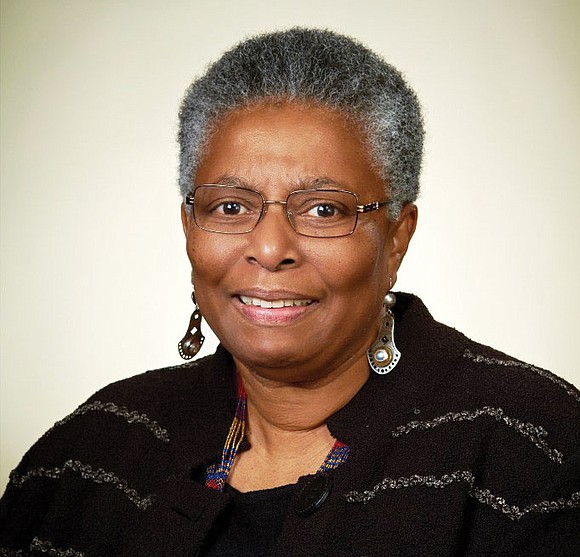Dr. Katie G. Cannon, renowned scholar who elevated role of black women in theology, dies at 68
Jeremy M. Lazarus | 8/16/2018, 6 a.m.
Dr. Katie Geneva Cannon made history in 1974 as the first African-American woman to be ordained a Presbyterian minister in the United States.
Dr. Cannon would use that breakthrough to become a driving force in creating the womanist theology that promotes the inclusion of women of color in shaping the understanding of faith. That womanist theology also challenges the practices and scriptural interpretations that enable the traditional white patriarchal view of religion, as well as the male-centered black liberation theology.
Based at Union Presbyterian Seminary in Richmond for 17 years, Dr. Cannon used her position a teacher, scholar, author and globetrotting speaker to advocate for this broader and more diverse view of religious and ethical thought.
In books like “Black Womanist Ethics” and “Katie’s Canon: Womanism and the Soul of the Black Community,” Dr. Cannon argued that the view of God’s creation is more expansive and more diverse when it is informed by the moral wisdom in the everyday lives of black women.
Her insistence on this view, admirers said, led others, including gays, lesbians and transgender individuals of faith, to seek their own inclusion in scholarship and ministry.
Dr. Cannon’s influence on the seminary, the Presbyterian Church, former students who went on to become church pastors and the wider religious community is being recognized following her death on Wednesday, Aug. 8, 2018. She was 68.
“Dr. Cannon was greatly admired and loved as a scholar, teacher and friend,” Union Presbyterian Seminary President Brian K. Blount stated in announcing her death.
He noted that Dr. Cannon publicly disclosed in June her diagnosis of leukemia that left her dependent on blood transfusions. Students, faculty and staff organized a blood drive to show their support for her treatment.
While a funeral for Dr. Cannon was held Tuesday, Aug. 14, in her native North Carolina, the Richmond seminary will celebrate her life in a memorial service 11:30 a.m. Monday, Sept. 10, at Watts Chapel on the North Side campus, 3401 Brook Road.
Dr. Cannon was the founder of the seminary’s Center for Womanist Leadership, and her role developing a fresh, black-oriented, female-centered theology received special emphasis in April.
On the 44th anniversary of her historic ordination and despite battling leukemia, she co-organized the center’s inaugural conference in Richmond that drew 250 religious scholars from across the country. It featured 14 prominent African-American women speakers, including Alice Walker, the Pulitzer Prize-winning poet, activist and author of “The Color Purple.”
Born in Kannapolis, N.C., Dr. Cannon grew up in a religious family. Her parents were elders in the Presbyterian church the family attended, but she also felt the sting of racial bigotry that showed the disconnect between actual conditions she faced and the Christian message she was being taught.
“I hated segregation,” she said in a podcast at the seminary in March in seeking to explain why the womanist conference in April was so important.
“I couldn’t go to the library, couldn’t go to the swimming pool, couldn’t go to the YWCA. Everything was forbidden, outlawed, and you didn’t want to risk doing it knowing somebody might get killed.”
Buoyed by the Civil Rights Movement that began ushering in change, Dr. Cannon began teaching religion at the college level after earning her bachelor’s degree in 1971 from Barber-Scotia College in Concord, N.C., and her master’s of divinity from the Johnson C. Smith Theological Seminary in Atlanta in 1974.
Returning to North Carolina, she was ordained as a minister by the Catawba Presbytery, becoming the 155th female and the first African-American woman ordained in what is now the Presbyterian Church USA.
Initially a supply pastor, she went to New York to become an instructor at the New York Theological Seminary, where she began her development as a scholar. After earning her doctoral degree at Union Theological Seminary in New York in 1983, she taught at the Harvard Divinity and Episcopal Divinity schools in Cambridge, Mass., and spent nine years as a religion studies professor at Temple University in Philadelphia before joining the faculty of Union Presbyterian Seminary in 2001.
During the mid-1980s, she joined with two other scholars, Jacquelyn Grant and Delores Williams, in seeking to reform black liberation theology and traditional religion with the perspective of African-American women. Their goal: To encourage women to reclaim their identity and throw off the mental shackles imposed by patriarchal norms.
Dr. Cannon frequently was invited to speak at religious events around the globe and also spent time as a visiting professor at Davidson College and Williams College.
She was a past president of the Society for the Study of Black Religion and produced an array of published papers and books in support of womanist theology.
Dr. Cannon received numerous honors for her work as an educator, including Spelman College’s Distinguished Professor Award, Virginia Union University’s School of Theology Beautiful Are The Feet Award and the American Academy of Religion’s Excellence in Teaching Award.
“Teaching is my ministry. I love teaching to empower, to equip, to set people free” she said in a video that was played in June when the Presbyterian Church USA awarded her its Excellence in Theological Education Award during a meeting of the church’s General Assembly in St. Louis.
Survivors include her mother, Corine L. Cannon; sisters Sara C. Fleming, Doris C. Love and Sylvia C. Moon; and brothers John Cannon and Jerry Cannon.







